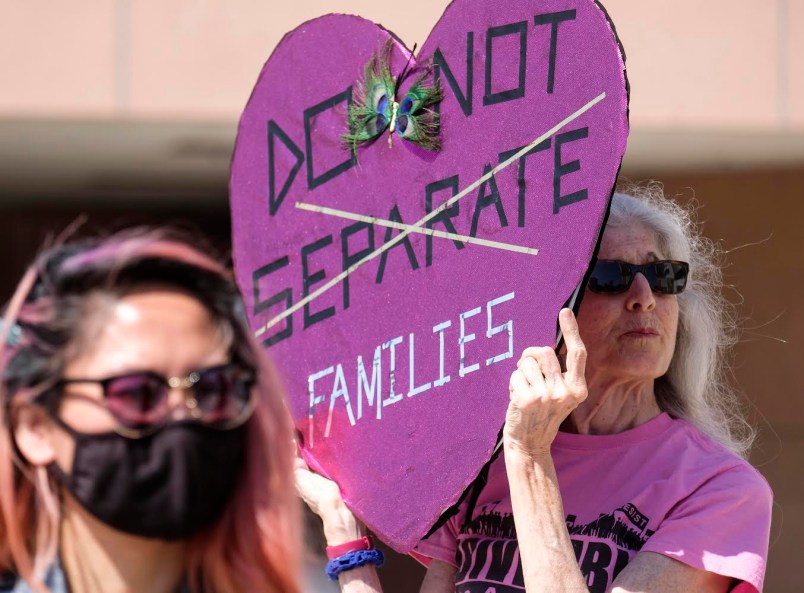In a filing in federal court on Tuesday, the American Civil Liberties Union accused the Trump administration of unnecessarily delaying the reunification of immigrant children and parents — arguing that the government’s practice of DNA testing every family violates their privacy and civil liberties, slows down the reunifications, and is not required either by law or by current circumstances.
Since a federal court first ordered the government in late June to reunite all of the roughly 3,000 families separated under Trump administration’s “zero tolerance” policy, the administration has claimed that the two-week timeline for returning children younger than five has forced it to subject all parents and children to cheek-swab DNA tests, which take at least a week for a private contractor to process. The administration says its usual procedure of verifying parentage through documents and interviews is too slow.
The administration is also arguing that federal anti-trafficking laws require both stringent parental verification and criminal background checks to determine whether a parent is “fit” to be reunited with his or her child. Both are time-consuming processes that caused the administration to blow past the July 10 deadline for the first reunifications.
The ACLU disagreed with these assertions, arguing in a new court filing that “the Government should not be allowed to delay reunification to conduct procedures that would not have been used if the child had not been forcibly taken from the parent.”
As lawyers challenging the family separations have argued repeatedly in court, the Trafficking Victims Protection Act (TVPRA) the administration is citing was not intended to apply to children taken from their parents by the U.S. government. Rather, it was drafted to protect children who came to the U.S. unaccompanied and who needed to be released to a relative or other sponsor.
The law’s vetting procedures, the ACLU argued Tuesday, do not justify keeping children under five away from their parents a single day longer.
“The purpose of the TVPRA is to promote the best interests of the child and to reunite families,” they wrote. “Delayed reunification, especially for babies and toddlers, is not in the best interests of the child.”
Genetic Material
Much of the ongoing disagreement between the ACLU and the Trump administration around how and when to reunite the immigrant families has centered on the thorny question of DNA testing.
The Trump administration’s Department of Health and Human Services, which currently has custody over thousands of separated children, says that while its usual practice is to verify family relationships through interviews and documents, the court’s timeline does not give it time to do so.
“HHS believes that, to reliably verify parentage and to do so within or close to the Court’s deadlines, HHS must be able to use DNA testing generally to determine parentage,” the administration wrote to the court on Tuesday. “Many potential plaintiffs do not have adequate documentation, and HHS does not control how fast other countries’ consulates will provide documentation.”
The administration claims that the DNA testing is further necessary because “children are smuggled across the border or trafficked by adults who fraudulently or inaccurately hold themselves out as parents.” Yet in the example the administration provides in the filing, three adults who were traveling with and separated from children younger than five who were not their own voluntarily disclosed that they were not the children’s biological parents. They were not, the ACLU emphasizes in a footnote, outed with DNA testing.
In the filing, the ACLU argues that the DNA tests should only be used as a last resort after the government has attempted to find “documentary, testimonial, or other evidence of parentage,” and in cases where there is reason to suspect that the person from whom the child was taken is not his or her parent.
“It is inherently coercive for the Government to require parents to submit to DNA testing to get back the children that were unlawfully taken from them,” ACLU attorneys wrote. “Parents should not have to sacrifice their privacy rights, and face the risk of having their DNA information collected in a Government database, to be reunified with their children.”
Additionally, the ACLU argued, the Trump administration should not automatically deny reunification to families that do not genetically match.
“The lack of a DNA match is not conclusive proof of the lack of a parent-child relationship, in recognition that many parents are not the biological parents of their children,” they write. “For example, some parents may not be aware that they have no biological relationship to their child in cases of undisclosed rape or adultery.”
As they prepare to go back before Judge Dana Sabraw in San Diego on Tuesday to iron out their significant remaining disagreements, the two sides proposed a compromise agreement that stipulates that “the federal government will not use the DNA samples or test results for any purpose besides verifying parentage, and will ensure that the DNA samples and test results are destroyed afterwards.”
Read the full filing below:







They wouldn’t do that, would they?
Yes they wood for sure.
The DOJ under Trump is corrupt and unethical. WE took these parents’ kids away - it’s not like they abandoned them and therefore need to prove their fitness as parents to have them returned… In addition to using DNA testing as a weapon, they are arguing that they need to check if the parents have ever been accused of a misdemeanor, etc. This is about the equivalent of removing children from parents who’ve received a speeding ticket - we don’t do that. Will the courts be able to hold the line? I just don’t know . . . . .
Brett Kavanaugh’s DNA must be tested. And Justice Kennedy’s DNA - what if Kavanaugh is Kennedy’s love child?
I’ll go further. Everyone who is indicted (maybe everyone being investigated) by Mueller needs DNA testing and their kids should be removed as a caution. No need to tell the parents where the kids are being held either.